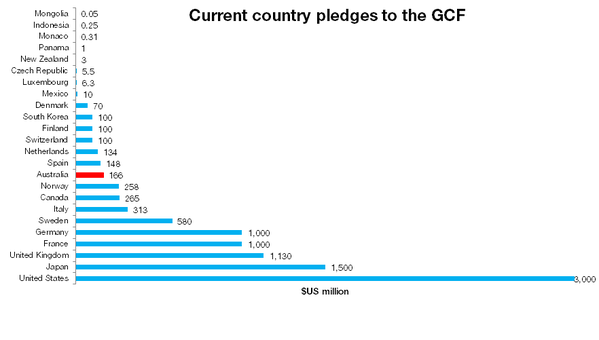Surprise Australia Contribution to the Green Climate Fund
Hamish M | December 9, 2014.
In a shock announcement today, Australian foreign minister Julie Bishop told the UN climate change conference in Lima that Australia is committing AU$200 million to a climate change adaptation fund. The Green Climate Fund (GCF), having been set up for developed countries to finance climate adaptation in the developing world, has increasingly been a source of embarrassment for Australia, as the only major developed country not to contribute.
France and Germany have made the largest single contributions to the GCF, pledging US$1 billion each. Canada has contributed $265 million and Switzerland, Denmark, and Norway have also made pledges of $100 million. Australia’s announcement takes the total global contributions over the psychologically significant $10 billion figure. However, with the ultimate goal set at $100 billion by 2020, it is still far from satisfying climate groups.
 Certainly, the surprise announcement was met with skepticism by civil society actors. Kelly Dent, policy advisor for Oxfam Australia said: “This can only be called a first step and falls short of [Australia’s] fair share”. Based on the size of Australia’s economy, it was expected to contribute up to $350 million to the fund. ActionAid described the commitment as “grossly insufficient”.
Certainly, the surprise announcement was met with skepticism by civil society actors. Kelly Dent, policy advisor for Oxfam Australia said: “This can only be called a first step and falls short of [Australia’s] fair share”. Based on the size of Australia’s economy, it was expected to contribute up to $350 million to the fund. ActionAid described the commitment as “grossly insufficient”.
Speaking from Australia, Prime Minister Tony Abbott has confirmed that this contribution will not be an additional injection of funds. It will instead be from the foreign aid budget that Australia recently cut by approximately $8 billion over the course of five years.
Just last week and throughout the G20, the Prime Minister ruled out contributing to the fund, saying that: “We are already doing a very great deal and I suppose given what we are doing, we don’t intend, at this time, to do more”. The reluctance of this government to commit to climate action, and Abbott’s notorious skepticism towards climate science, have cast doubt over whether this flip actually constitutes a genuine policy change.
Abbott also announced the creation of a task force based within his own office, to consider post-2020 targets. This comes just days after details emerged of a rift between him and Bishop over the issue of climate change. After rejecting Bishop’s initial request to attend the Lima talks, Abbott only permitted her attendance on condition that she be chaperoned by trade minister Andrew Robb, a climate skeptic and Abbott loyalist. The extent to which the announcement can be considered progress therefore remains to be seen.
It is expected that more detail will emerge in the coming months, as Australia, like the rest of the world, prepares to announce its entire suite of climate policies by the May 2015 deadline set by the UN.
It was not only the general public taken aback by the announcement. An Australian government source confirmed with The Verb that the Australian negotiators themselves were unaware of the policy change prior Bishop’s announcement at the conference. While Bishop addressed the main plenary, the government team attempting to thrash out a new climate agreement were working away in the backrooms of the conference, unaware of the surprise decision. This appears to conflict with Bishop’s claim that the announcement was a ‘considered’ decision that went through ‘due process’ over the last 6 months.
The announcement came as the negotiations in Lima stall with countries failing to find consensus over the extent and timing of their contributions to emissions cuts. Just today, Sudan, on behalf of the poorest countries of the world, insisted upon the necessity of developed nations funding climate adaptation, only to be shut down by the United States who sought to water down the treaty.
Regardless, the breaking news will likely inject a new and different energy into the Lima negotiations. Australia is expected to make two more announcements this week with Bishop just announcing: “Tomorrow I will make a national announcement and it will be a positive and optimistic one.”
With research from Sydney Pead.













comment